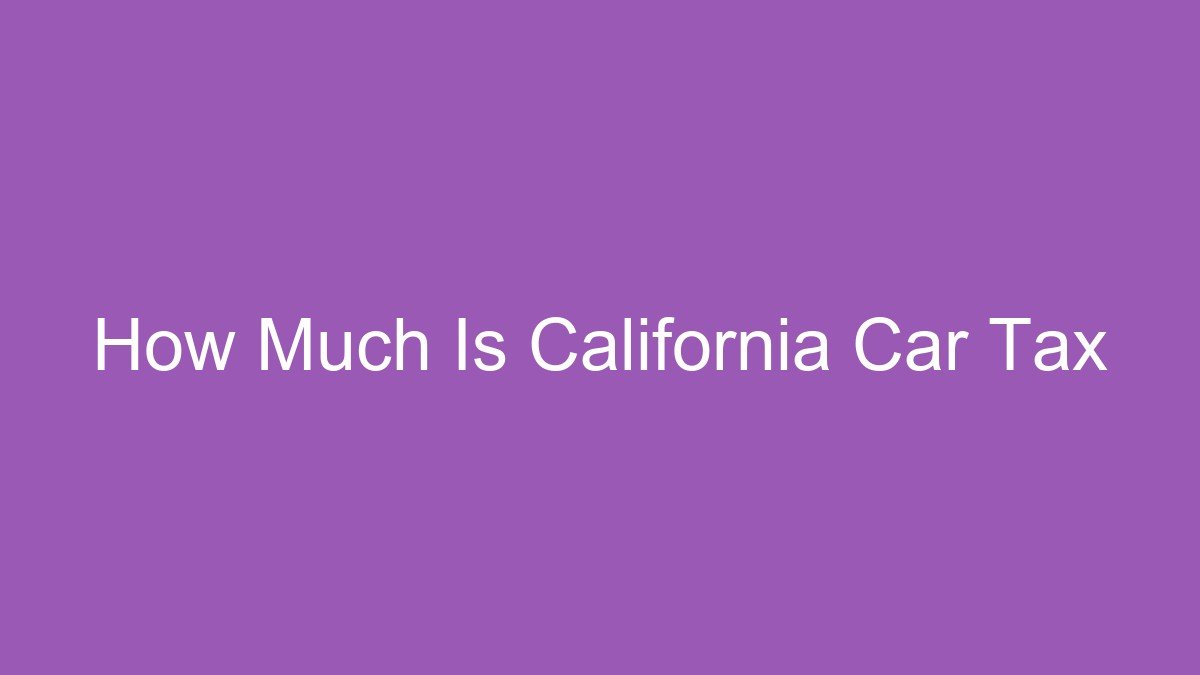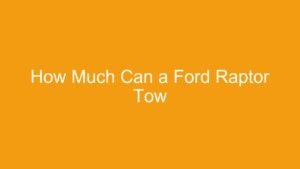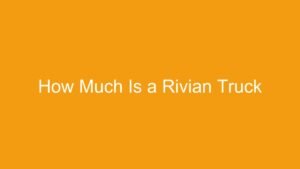
Contents
- How Much Is California Car Tax? Your Ultimate Guide to CA Vehicle Fees
- FAQ
How Much Is California Car Tax? Your Ultimate Guide to CA Vehicle Fees
Welcome to the Golden State, where the sun shines bright, the roads beckon, and yes, even your car comes with its own set of taxes and fees! If you’ve ever found yourself scratching your head, wondering “How much is California car tax?” you’re definitely not alone. It can feel like a maze, but don’t worry – we’re here to be your friendly guide.
This detailed article will break down California’s car tax system, explaining the various fees, how to calculate them, and giving you all the tips and tricks to navigate it like a pro.
Understanding the Golden State’s Vehicle Fees: It’s Not Just One Tax!
The first, and perhaps most important, thing to understand is that “California car tax” isn’t a single, flat tax. Instead, it’s a combination of several different fees and taxes that contribute to the overall cost of owning and registering a vehicle in the state. These fees are collected by the California Department of Motor Vehicles (DMV) and serve various purposes, from funding transportation projects to supporting local services.
🛒 Recommended Product
Let’s dive into the main components:
1. California Sales Tax (The Big One for Purchases!)
This is often the largest “tax” you’ll pay when acquiring a vehicle.
- What it is: A percentage of the vehicle’s purchase price.
- Who pays it:
- When buying from a licensed dealer (new or used): You will pay sales tax based on your local sales tax rate. This is usually added to the purchase price of the vehicle.
- When buying from a private party: You generally do NOT pay California sales tax directly to the seller. However, you will still pay registration fees when you transfer the title at the DMV.
- How it’s calculated: The sales tax rate varies by county, but the statewide base rate is 7.25%. Many cities and counties add their own district taxes on top of this, pushing the total rate higher. Most Californians pay between 7.25% and 10.75% in sales tax.
- Example: If you buy a car for $30,000 in an area with a 9% sales tax rate, you’d pay $2,700 in sales tax ($30,000 * 0.09).
- Key takeaway: This applies only to the purchase price and is separate from annual registration fees.
2. Annual California Vehicle Registration Fees
These are the fees you pay every year (or sometimes every two years) to keep your car legally registered to drive on California roads. They consist of several individual charges:
- Vehicle License Fee (VLF):
- What it is: This is perhaps the closest thing to a “car tax” many people think of. It’s a fee based on the depreciated value of your vehicle.
- How it’s calculated: The VLF rate is currently 0.65% of your car’s depreciated value. The DMV assesses this value annually, so it typically decreases each year your car gets older.
- Purpose: Funds local government services.
- Registration Fee:
- What it is: A flat fee charged to register your vehicle.
- Current amount: Generally $31 (as of early 2024, but subject to change).
- California Highway Patrol (CHP) Fee:
- What it is: A fee that helps fund the operations of the California Highway Patrol.
- Current amount: Generally $30 (as of early 2024, but subject to change).
- Weight Fee:
- What it is: A fee based on the weight of your vehicle. Heavier vehicles (like trucks, SUVs, and some large sedans) pay more.
- How it’s calculated: Varies by vehicle type and weight class.
- Important note: Trailers also pay a weight fee.
- Smog Abatement Fee / Smog Check Fee:
- What it is:
- Smog Abatement Fee: For newer vehicles (typically the first 8 years, or the first 4 years for light-duty diesel vehicles), you pay an annual Smog Abatement Fee instead of requiring a physical smog check. This is currently $20.
- Smog Check Fee: If your vehicle is older and requires a smog check, you’ll pay for the actual smog test at a licensed station (this cost is not collected by the DMV but is required for registration renewal).
- Key takeaway: Most vehicles will either pay the abatement fee or undergo a smog check for renewal.
- What it is:
- Transportation Improvement Fee (TIF):
- What it is: A relatively newer fee designed to fund state and local transportation projects.
- How it’s calculated: It’s tiered based on your vehicle’s value. The higher your car’s value, the more you pay.
- Example Tiers (subject to change):
- Value under $5,000: $25
- Value $5,000 – $24,999: $50
- Value $25,000 – $34,999: $100
- Value $35,000 – $59,999: $150
- Value $60,000 or more: $175
- Example Tiers (subject to change):
- County/District Specific Fees:
- What it is: Many counties and special districts impose their own additional fees to fund local programs like air quality initiatives, transportation improvements, or public safety. These are usually small, flat fees.
- How it’s calculated: Varies by your county of residence.
How to Calculate Your California Car Tax and Fees
While the DMV does most of the heavy lifting, understanding the components helps you anticipate costs.
Step-by-Step for a New Car Purchase (or used car from a dealer):
- Determine the Negotiated Purchase Price: This is the price of the car before any taxes or additional fees.
- Find Your Local Sales Tax Rate: Visit the California Department of Tax and Fee Administration (CDTFA) website or simply search “California sales tax rate [your county]” online.
- Calculate Sales Tax: Multiply your purchase price by your local sales tax rate.
- Example: $35,000 (car price) * 0.095 (9.5% sales tax) = $3,325 in sales tax.
- Estimate Initial Registration Fees: For a brand-new car, you’ll pay initial registration fees which typically include:
- Vehicle License Fee (VLF)
- Registration Fee
- CHP Fee
- Weight Fee (based on vehicle type)
- Smog Abatement Fee (since new cars are exempt from smog checks for 8 years)
- Transportation Improvement Fee (TIF)
- Any applicable County/District fees
- The easiest way to get an accurate estimate for initial registration is to use the California DMV’s online fee calculator. Your dealership will also provide a detailed breakdown of these fees.
Step-by-Step for Annual Registration Renewal:
- Wait for Your Renewal Notice: The California DMV will mail you a renewal notice several weeks before your registration expires. This notice will clearly list all the fees due for your specific vehicle. This is the most accurate way to know your exact cost.
- Check Your Vehicle’s Value: The DMV calculates your VLF based on your vehicle’s depreciated value. This isn’t something you typically calculate yourself.
- Note Any Required Smog Check: If your vehicle requires a smog check, the renewal notice will indicate it. You’ll need to get this done before you can renew your registration.
- Use the DMV Online Calculator (if you lose your notice or want to estimate): The DMV offers an online calculator where you can input your license plate number and VIN to get a fee estimate. This is incredibly helpful!
- Always Budget Ahead: Vehicle taxes and fees are a significant cost. Factor them into your initial car purchase budget and your annual household expenses.
- Know Your Local Sales Tax Rate: Before buying a car from a dealer, know the exact sales tax rate for your home address. It can make a difference of hundreds or even thousands of dollars.
- Utilize the DMV’s Online Resources: The California DMV website (dmv.ca.gov) is your best friend. They have detailed explanations of fees and, critically, an online fee calculator that can give you personalized estimates.
- Don’t Ignore Your Renewal Notice: These notices contain all the information you need, including your due date and any requirements like smog checks. Paying late can incur penalties.
- Keep Your Vehicle’s Documents Organized: Having your registration, title, and previous renewal notices handy makes any DMV interaction smoother.
- Consider Electric Vehicles (EVs) or Hybrids: While they still pay most standard fees (including the TIF), some specific local or state incentives might exist for certain low-emission vehicles. Always check the latest programs.
Common Mistakes to Avoid
- Forgetting Sales Tax on Dealer Purchases: Many people focus only on the car’s sticker price. Always remember to factor in the sales tax when budgeting for a dealer purchase.
- Ignoring Annual Registration Renewal Notices: Letting your registration expire leads to late fees and penalties, which can add up quickly. It can also lead to citations if you’re pulled over.
- Not Budgeting for the Full Cost: Initial registration for a new car can be several hundred to over a thousand dollars in addition to the sales tax. Don’t be surprised!
- Assuming Fees are Static: California’s fees can change over time due to legislative actions. Always check the current rates or your official DMV notice.
- Delaying Smog Checks: If your renewal notice says you need a smog check, get it done well before your registration expires. You cannot renew your registration without a valid smog certificate (if required).
- Misunderstanding Private Party Sales: While you don’t pay sales tax to the seller in a private party sale, you are still responsible for paying all applicable registration, title transfer, and other DMV fees when you register the vehicle in your name.
Frequently Asked Questions (FAQs)
Q: Do I pay sales tax on a private party used car sale in California?
A: No, California does not collect sales tax on private party used car sales. You will still be responsible for all applicable registration fees, title transfer fees, and any other required charges when you register the vehicle at the DMV.
🛒 Recommended Product
Q: Do electric vehicles (EVs) or hybrid cars pay less in California car tax?
A: EVs and hybrids are subject to most of the same registration fees as gasoline-powered cars, including the VLF, Registration Fee, CHP Fee, Weight Fee, and Transportation Improvement Fee. While they don’t pay the Smog Abatement Fee (or need smog checks), some may pay an annual “Road Improvement Fee” to compensate for not paying gas taxes. Any specific incentives or rebates for EVs are separate from these standard annual fees.
Q: Can I pay my California car tax monthly?
A: No, California DMV registration fees are typically paid annually or biennially (for some non-commercial vehicles). There isn’t an official monthly payment plan through the DMV for these fees.
Q: What happens if I pay my California car tax late?
A: The DMV assesses penalties for late payments. These penalties increase the longer your payment is overdue. Driving with expired registration can also result in traffic tickets and fines. Always aim to pay before your expiration date.
Q: How does the DMV determine my car’s “value” for the Vehicle License Fee (VLF)?
A: The DMV uses a standardized formula based on the vehicle’s original purchase price or declared value when new, and then applies a depreciation schedule each year. This is not the same as your car’s market value.
Conclusion
While the “California car tax” system can initially seem complex, breaking it down into its individual components makes it much more manageable. Remember, it’s a combination of sales tax (for purchases) and various annual registration fees.
🛒 Recommended Product
By understanding what you’re paying for, using the DMV’s excellent online tools, and budgeting effectively, you can avoid surprises and keep your vehicle legally on the road. Drive safe, and enjoy those California highways!
FAQ
Q. How much is the California car sales tax generally?
A. The statewide base sales tax rate in California is 7.25%. However, local district taxes are added on top of this, meaning the actual sales tax rate you pay will vary depending on the city and county where the car is purchased and registered. This combined rate typically ranges from 7.25% to over 10%, and it is applied to the purchase price of the vehicle when bought from a licensed dealership.
Q. What is the California car tax based on?
A. When you purchase a new or used vehicle from a licensed dealership, the primary tax is the sales tax, which is based on the vehicle’s purchase price. Additionally, when registering your vehicle (whether new or used, private party or dealership), you’ll pay various DMV fees, including a Vehicle License Fee (VLF). The VLF is calculated as a percentage (currently 0.65% for registration periods beginning on or after January 1, 2011) of your vehicle’s depreciated value, not the purchase price.
Q. Are there different types of “car taxes” in California, or is it just one fee?
A. There are several components often referred to collectively as “car tax.” The most significant is the sales tax (or use tax), which is a percentage of the vehicle’s price paid when purchased from a dealership. Separately, the California DMV charges various annual registration fees, which include the Vehicle License Fee (VLF), a flat registration fee, potentially a weight fee (for commercial or heavier vehicles), and local transportation surcharges. The VLF, specifically, is a tax based on the vehicle’s value, while sales tax is based on its purchase price.
Q. Do I have to pay California sales tax if I buy a car from a private party?
A. No, you generally do not pay California sales tax when you purchase a vehicle from a private party. The sales tax (or use tax) only applies to purchases made from licensed dealerships. However, you will still be responsible for paying all applicable DMV registration fees, including the Vehicle License Fee (VLF), when you register the vehicle in your name.
Q. How is the Vehicle License Fee (VLF) calculated, and how much is it?
A. The Vehicle License Fee (VLF) is part of your annual registration renewal and is calculated as 0.65% of your vehicle’s depreciated value. The California DMV uses a specific formula to determine this value, starting with the manufacturer’s suggested retail price (MSRP) and depreciating it over 11 years. For example, a vehicle with a depreciated value of $20,000 would incur a VLF of $130 (0.65% of $20,000). This fee is paid annually as part of your vehicle registration.
Q. What if I move to California with an out-of-state vehicle; do I pay California car tax?
A. If you bring a vehicle from out-of-state into California, you may be subject to a “use tax” if you haven’t paid sales tax in another state at a rate equal to or greater than California’s rate. This typically applies if the vehicle was purchased less than 12 months before being brought into California. Regardless of use tax applicability, you will still need to pay all standard California DMV registration fees, including the Vehicle License Fee (VLF), when you register the vehicle in California.
Q. Are there any exemptions or ways to reduce the California car tax?
A. While general sales tax on vehicle purchases from dealerships is mandatory, certain situations can reduce the taxable amount. For example, sales tax is calculated on the vehicle’s price after any trade-in value is applied, effectively lowering the taxable amount. The Vehicle License Fee (VLF) is based on depreciation, so older, less valuable vehicles will naturally have a lower annual VLF. There are no broad exemptions for the primary sales tax or VLF for most private individuals, though specific, limited exemptions or programs might exist for certain vehicle types or organizations.
Related Articles
How Much Is a Corvette
How Much Does a Corvette Cost? Your Ultimate Guide to Unlocking the Dream Ah, the Corvette. Just uttering the name conjures images of sleek lines, exh…
How Much Is a Grand Wagoneer
How Much Is a Grand Wagoneer? Your Complete Guide to Understanding the Price Tag The Grand Wagoneer. Just the name conjures images of luxurious comfor…
How Much Is a Mclaren 720s
How Much Is a McLaren 720S? Your Ultimate Guide to Understanding the Price Tag The McLaren 720S. Just the name conjures images of blistering speed, ae…
Affiliate Disclosure: As an Amazon Associate, I earn from qualifying purchases made through links on this site.















